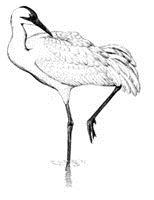North American Crane Working Group

Proceedings of the North American Crane Workshop
Date of this Version
2010
Document Type
Article
Citation
Spalding, M.G., S. Terrell, and W.B. Brooks. Pathology associated with lightning strike and drowning mortality of whooping cranes in Florida. In: Hartup, Barry K., ed., Proceedings of the Eleventh North American Crane Workshop, Sep 23-27, 2008, Wisconsin Dells, Wisconsin (Baraboo, WI: North American Crane Working Group, 2010), p. 215.
Abstract
Severe thunderstorms associated with a strong front passing through the Gulf Coast of Florida on the night of 1-2 February 2007 resulted in the death of 17 whooping cranes (Grus americana) penned at Chassahowitzka National Wildlife Refuge. Postmortem examination of 4 of the birds revealed saline fluid in lungs and airsacs consistent with drowning. Coagulation necrosis and other histologic changes in kidney, peripheral nerve, airsac membranes, and heart muscle further indicated electrocution and are comparable to other cases of electrocution associated with power-line strikes in Florida. Aspiration of seawater was the most likely cause of death of birds that were stunned by lightning strike. Tissue changes in some, but probably not all of the birds, would have resulted in death if they had not drowned. Retrospective examination of lightning and tidal records support this presumed cause of death. The pathology associated with lightning strikes has only rarely been illustrated for birds. We provide photos of characteristic lesions and compare them with known power line electrocution cases.
Included in
Behavior and Ethology Commons, Biodiversity Commons, Ornithology Commons, Population Biology Commons, Terrestrial and Aquatic Ecology Commons


Comments
Reproduced by permission of the North American Crane Working Group.